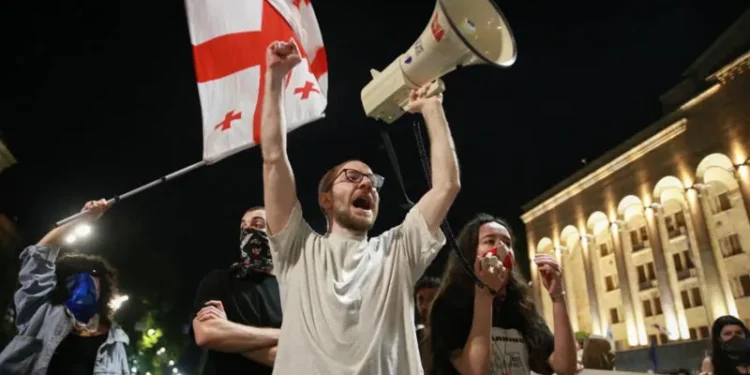Protests in Georgia continue despite a government crackdown involving detentions, heavy fines, and restrictive laws, the Associated Press reports.
The demonstrations erupted after the government suspended negotiations on joining the European Union, sparking a wave of discontent. Authorities have since tightened measures, introducing laws that target demonstrators, rights groups, NGOs, and independent media outlets.
The repressions have drawn comparisons to Georgia’s powerful neighbor and former imperial ruler, Russia, where President Vladimir Putin is known for suppressing dissent. Critics accuse the ruling Georgian Dream party of steering the country closer to Moscow’s orbit.
Violence intensified in late November 2024, when security forces dispersed largely peaceful protests. Over a two-week span, more than 400 people were detained. Amnesty International reported that at least 300 detainees suffered brutal beatings and other forms of ill-treatment, much of it inside detention facilities.
According to Transparency International Georgia, from April 2024 to August 2025, at least 76 protesters faced criminal charges, with more than 60 sent to prison. The watchdog believes the true figures are higher, pointing to widespread use of heavy fines and politically motivated prosecutions.
The crackdown has also extended to opposition figures, rights defenders, and media. In the summer of 2025, eight opposition leaders were jailed for refusing to cooperate with a parliamentary inquiry, followed by two more detentions on separate charges. The opposition has denounced the cases as politically driven. In August, authorities froze the bank accounts of seven rights groups, alleging they supplied protesters with equipment such as masks, pepper spray, and protective goggles used in clashes with police.
Despite the government’s stance, Prime Minister Irakli Kobakhidze insisted this week that Georgia’s goal of joining the EU by 2030 remains “realistic and achievable.”
But a European Union official told the AP that the government’s actions undermine that goal. “The repressive measures carried out by the Georgian authorities are far from what is expected of a candidate country,” the official said, speaking on condition of anonymity. “The EU is prepared to consider Georgia’s return to the membership track if the government takes credible steps to halt democratic backsliding.”
Further demonstrations are planned for Saturday, coinciding with local elections, signaling continued unrest in the South Caucasus nation of 3.7 million people.
Image: IPN














